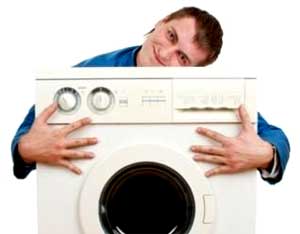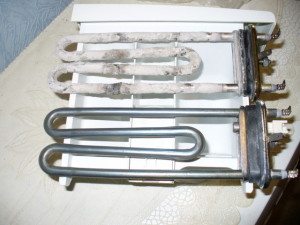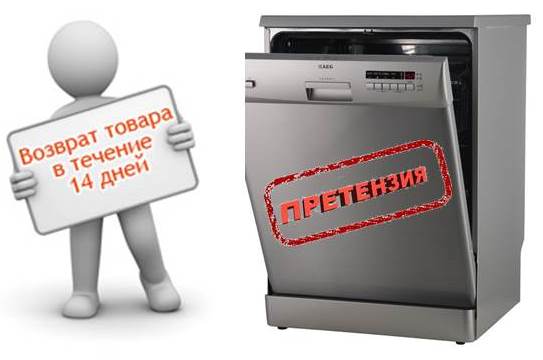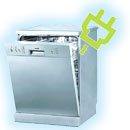We extend the life of the washing machine ourselves!
 Most of us, when buying household appliances, hope that they will work properly for a long time. Some people are lucky and do not have any problems, while for others the unit breaks down in the first years of use. People often ask the question: “What is the lifespan of a washing machine?”
Most of us, when buying household appliances, hope that they will work properly for a long time. Some people are lucky and do not have any problems, while for others the unit breaks down in the first years of use. People often ask the question: “What is the lifespan of a washing machine?”
In rare cases, the manufacturer and seller give a guarantee of more than three years, and experts agree that the first breakdowns occur after approximately five years of service. It is impossible to accurately determine the period, because there are many factors that determine the durability of the unit.
What affects the service life of a washing machine?
Do you think it's just a matter of the manufacturer's brand? Whatever the case, reliability and operating time depend on:
- The presence of a defect. Unfortunately, even the products of expensive popular brands are not immune from this. Of course, you will be able to return and exchange such a product, but to save time and effort, take a closer look at the condition of the equipment when purchasing. A defect can affect the immediate operation of the equipment both at the very beginning of its service (during the first times of use) and later;
- Natural wear and tear. This factor appears after five years if the machine has been used frequently;
- Inaccurate use. If you turn off the machine while washing, try to open the door or suddenly turn off the power supply, this can lead to unpredictable negative consequences;
- Force majeure circumstances such as power surges or accidental mechanical damage. Unfortunately, this is impossible to control.
What can you do to extend the performance of your washing machine? In fact  First of all, you need to read the instructions included in the kit. Many people think that they already have a great understanding of management, but the little book also contains big secrets on how to properly care for the equipment and what should be avoided when using it.
First of all, you need to read the instructions included in the kit. Many people think that they already have a great understanding of management, but the little book also contains big secrets on how to properly care for the equipment and what should be avoided when using it.
How to fix breakdowns or avoid them?
Of course, it is rare that a washing machine owner undertakes repairs on his own, preferring to entrust this task to a specialist. But you still need to know what can cause breakdowns and damage in order to prevent their occurrence later.
| Breaking | Possible causes and solutions to the problem |
| Wear of parts | As a rule, the functional elements of the washing machine wear out, and this happens under the influence of strong vibrations. To reduce their level, it is necessary to place the machine on a flat, hard floor so that there are no gaps anywhere between the legs and the contact surface. Also, do not fill the drum with clothes too tightly or put one heavy item with light ones - this shifts the center of gravity and leads to vibration. |
| Blockage | The most common cause of this is small objects (buttons, zippers, fasteners, coins, pins, etc.) getting into the pump drum or filter. It’s not difficult to avoid the problem; you just need to carefully check your clothes and pockets, fasten buttons and zippers before washing. If you have diagnosed the drum and pump for the presence of foreign objects, removed them, and strange noises during operation have not stopped, then you should call a technician. |
| Heating element combustion | Although experts do not exclude the possibility of wear, the main factor is overheating of the element due to scale formation.According to statistics, the heating element burns out after about 8 years of service of the washing machine. The only solution in such a situation is to repair and replace the element, which, by the way, is not that expensive. |
| Computer crashes | Computer problems are usually caused by sudden surges in electricity or a unit falling down. Few people are immune from this. If some buttons stop working, or the screen goes blank for unknown reasons, call a technician before the system breaks down completely. |
Prevention of failures and breakdowns
Of course, the problem does not arise if it is not provoked. To ensure your washing machine remains reliable, follow a few simple rules.
- Leave the machine open to dry inside after washing. This will prevent the formation of both scale and mold;
- From time to time, wash the tray for washing powder and other products, as well as the recess for it. There may be traffic jams that interfere with the fence;
- Check the hose and drain system regularly for damage or cracks. They should also be changed every few years, since scale also accumulates inside, causing an unpleasant odor and sometimes even soiling of clothes;
- Clean the filter at the drain pump. Bad smells often come from there;
- Use an anti-scale agent once or twice a year or a hard water softener with every wash;
- Choose a moderate temperature setting if the quality of the wash triples for you. There is no need to waste energy, hot water and once again provoke the formation of scale;
- Clean with bleach and powder. They can be poured into the drum and run an empty machine. This helps remove bacteria from both the housing and the hose.
How to prevent scale formation?
First of all, determine how susceptible the heating element is to scale accumulation. If you wash in hard water almost every day, and even at temperatures above 60 degrees, then your unit needs to be protected like the apple of your eye.
Don't know what kind of water you have? It's simple. If soap is washed off the skin and hair quickly, then the water is hard, because the calcium and magnesium ions it contains cover and block the soap molecules, preventing it from foaming. If the situation is the opposite, and for a long time you cannot completely wash off the shampoo or rinse your clothes, then you have soft and clean water, which means there is less reason to worry. Want exact numbers? Contact the organization that supplies your home with water.
The choice of water temperature depends on the type of clothing. Think about it, how often do you need to wash at 60 or 90 degrees? In fact, not so often, except for light-colored underwear. And in general, things deteriorate from frequent washing in very hot water. So if you are satisfied with the quality of washing at low temperatures, then there is no point in wasting energy and hot water.
However, the choice of washing powder also plays an important role here. If possible, switch to a brand that is more expensive and of better quality, and this will help you save money on both hot water and new clothes. Try to stick to a maximum of 60-70 degrees when washing, and then scale will form much less often and less.
Anti-scale powders – a myth or not?
 Nowadays, you can increasingly see advertisements for a special powder that protects the heating element from scale. The creators claim that only their miracle product will help save the washing machine from imminent death.So, do Calgon and other similar products really help?
Nowadays, you can increasingly see advertisements for a special powder that protects the heating element from scale. The creators claim that only their miracle product will help save the washing machine from imminent death.So, do Calgon and other similar products really help?
In fact, their effectiveness has been greatly exaggerated. Firstly, such a powder will not protect against any breakdown (as we have already found out, the causes of failures are different) and will not prevent scale build-up if it has already begun to settle on the heating element. Secondly, it does not completely dissolve scale, but only prevents its formation, softening the water.
It turns out that if the heating element has already become overgrown with a decent layer of scale over several years, then it is better not to start using such powder at all. And simple cleaning of the element will cost much less.
Calgon is truly a way to extend the life of a washing machine for those who are willing to fork out the cash. In fact, many other high-quality washing powders already contain water softener, albeit in smaller quantities.
There is also such a thing as anti-scale, which is specially created for the total cleansing of scale from the heating element and the walls of the drum. It is poured into a tray and the empty washing machine is started for a short time at a temperature of 90 degrees. This procedure is done 1-2 times a year, the main thing is to choose the appropriate type of product. Whether it’s worth spending so much money on a separate product for each wash is, of course, up to you to decide.
Interesting:
Reader comments
- Share your opinion - leave a comment





















Add a comment